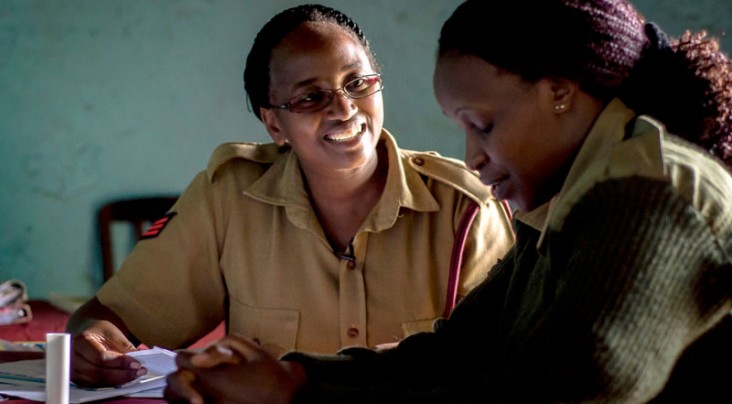- What We Do
- Agriculture and Food Security
- Democracy, Human Rights and Governance
- Economic Growth and Trade
- Education
- Ending Extreme Poverty
- Environment and Global Climate Change
- Gender Equality and Women's Empowerment
- Global Health
- Water and Sanitation
- Working in Crises and Conflict
- U.S. Global Development Lab

How one study found positive results by utilizing SMS text messaging
The tiny landlocked country of Lesotho is surrounded by South Africa and is a country with the second highest HIV prevalence in the world. In 2015, HIV prevalence was close to 23 percent with an estimated 310,000 people living with HIV. Most troubling is the high rate of TB-HIV co-infection. In 2011, between 80 percent and 90 percent of TB patients knew their HIV-positive status, but only about 50 percent were on antiretroviral therapy (ART) treatment. This startling statistic became the crux of a study that showed the promise of innovative mobile technology in improving clinical outcomes.
Launched in the Berea district of Lesotho in 2013, USAID, through the U.S. President's Emergency Plan for AIDS Relief, supported the Start TB Patients on ART and Retain on Treatment (START) study. The study was designed to identify an effective and cost-effective intervention that addresses programmatic, structural and psychosocial barriers to ART initiation and retention during TB treatment, with the ultimate goal of improving health outcomes among HIV-infected TB patients. A total of 12 health facilities in the Berea district were randomly chosen to deliver either a combination intervention package (CIP) or standard of care (SOC).
The SOC model contained four components: (1) nurses were trained on national TB guidelines; (2) all TB patients were offered HIV testing by lay counselors; (3) ART was available to TB-HIV patients in integrated clinics; and (4) TB patients had an assigned treatment supporter for their TB treatment. In addition to the aforementioned four components, the CIP model included trainings and mentorship to nurses using a clinical algorithm, transportation reimbursements for clinic visits to patients and treatment supporters, TB-HIV literacy treatment and disclosure education to patient and treatment supporters, as well as the inclusion of a unique mobile feature. Referred to as mHealth intervention, this intervention delivered SMS text messages to remind patients to take their medication. Through daily and weekly text messages, patients and treatment supporters received adherence and appointment reminders that were – in an effort to minimize HIV stigmatization – inconspicuously coded, such as “did you eat your meal today?”
Over the course of the study’s 29 month period, a total of 39,258 text messages were successfully delivered to all CIP participants: 657 patients and 178 treatment supporters. Close to 42 percent of patients stated that that the SMS messaging service made it easier for them to remember to take their TB or ART medications. As one patient stated, “I think the one that remind me to take my medication being the first class [ie, excellent], I don't make any mistake with the medication I fear and I can't miss them at all.” Healthcare workers also noted improvements in both quality and timeliness of communication between patients and providers and between nurses and village healthcare workers. “The use of SMS is very important,” said a village healthcare worker, “Suppose it rains heavily and I am unable to attend him, I text him and say, ‘It is your time now. Have you remembered your food?’ He already knows. I will have taught him that when I say that, I mean it's time to take his pills. So, it is very helpful this SMS thing; it helps us meet our patients.”
Patient interviews also showed that CIP participants were better about taking their ART and TB medications more regularly as compared to the SOC participants. Adherence to ART medication was 86.3 percent in the CIP model versus 80.7 percent in the SOC model, and to TB medications was 89.1 percent in CIP model versus 79.5 percent in SOC model.
Like a lot of mHealth interventional studies, the START study did encounter challenges, specifically related to lack of personal mobile phones and unstable electricity in Lesotho. However, unlike a lot of mHealth interventional studies, the START study managed to provide data on dual adherence of both HIV and TB medications in co-infected patients and examine the acceptability and the use of innovative mobile technology. Above all, the START study has given light to mHealth technology and its promising ability to improve TB-HIV clinical outcomes.
Additional Links:
- Using mHealth for HIV/TB Treatment Support in Lesotho: Enhancing Patient Provider Communication in the START Study
- HC3 Webinar Presentation: Using mHealth for TB-HIV Treatment Support In Lesotho: Enhancing Patient Provider Communication in the START Study
- Journal of Acquired Immune Deficiency Syndromes (JAIDS)







Comment
Make a general inquiry or suggest an improvement.